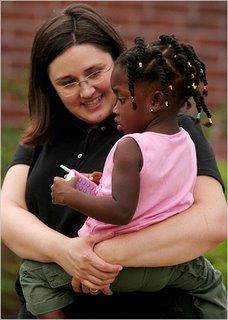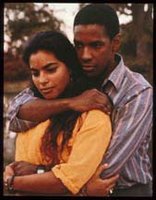 From the NYTimes:
From the NYTimes:
Couple #1
A white judge initially denied Nick and Emily Mebruer’s petition to adopt a black child, ruling that the Mebruers, a white couple who live in rural Lebanon, Mo., were “uniquely unqualified” to parent a black child because of their limited interaction with black people and culture. The ruling was overturned, and their daughter, Maggie, is now 3.
Sorry guys, the judge was right!!! Thank God they're raising a daughter and not a son. Somehow girls are usually better equipt to handle emotional chaos without becoming complete social deviants. I don't care how nice they are, in a country where 12% of the population is black, there's no reason to raise a black child in a community that is 95.99% white (0.9% black). No excuse! They need to sell their house/farm and move somewhere where that kid can connect, at an early age, with other people that look like her. (The same would apply if the kid were Asian. What they're doing is just dumb.) Maybe they'll figure it out when she gets too old to wear her hair in pigtails and NO ONE for miles and miles knows how to do her hair IF she doesn't have a nervous breakdown before then.
Score 0/10Couple #2 When Martina Brockway and Mike Timble, a white couple in Chicago, decided to adopt a child, Ms. Brockway went to an adoption agency presentation at a black church to make it clear they wanted an African-American baby....Ms. Brockway worked for years in predominantly black schools and now tutors children in foster care. Mr. Timble, who owns a promotional printing business, has a cousin who has adopted four black children. They live in an ethnically diverse section of northwest Chicago. But after working through the adoption process, Ms. Brockway said, they are considering moving to a neighborhood with more black professionals and finding a more diverse church.
wanted an African-American baby....Ms. Brockway worked for years in predominantly black schools and now tutors children in foster care. Mr. Timble, who owns a promotional printing business, has a cousin who has adopted four black children. They live in an ethnically diverse section of northwest Chicago. But after working through the adoption process, Ms. Brockway said, they are considering moving to a neighborhood with more black professionals and finding a more diverse church.
So, they look like white-bread-with-the-crust-cut-off in their photo but at least they
know some black people and they live
in Chicago, not around it, not near it. They're familiar with urban culture. The vast majority of black people in America live in an urban environment--thus the ever-so-sneaky-overly-PC use of "urban" as synonymous with "black"--so at least their child will have the benefit of that. They also seem to be aware of the challenges ahead and are considering lifestyle changes to remedy that.
Score 7/10Am I being mean? I don't think so. The best preparation anyone can have to raise a black child is to grow up in the midst of black people for two reasons: 1) most white people have no idea what it feels like to be a minority, much less black in America, 2) there are nuances of culture--songs, words, foods, styles--that can only be learned firsthand. They are absorbed by osmosis as they are experienced and they serve as unspoken connections between people of similar background.
Some people would probably say I place too much emphasis on culture, but I don't think so. I can tell you personal stories of my own ostracism over not being stereotypically "black" while having been raised with
two black parents. Or one Filipino kid I know who was raised by white folks in rural Iowa who didn't know he was Asian until he got in the military.
Nice! Or my biracial roommate in college who lived in a one-stop-light Ohio town and only saw other black people on vacation. Despite the fact that she's about Halle Berry's complexion, with curly brown hair, unlike the one "Spanish girl" at school, she never had a date. "But you're black," the boys said. Or the Korean girl I met in college who when questioned about her ethnicity could only offer a blank stare because her adoptive parents hadn't thought it was important to prepare her for that particular aspect of life apart from the world of insulation they had created for her.
It's bad enough to not know who your parents are but this is taking alienation to another level. I can't begin to imagine what that little girl in backwoods Missouri is going to face.
That's my 5
¢. Weigh in if you like.
[In case you're wondering, Angelina Jolie gets 8.5/10. The extra point is for wealth and mobility. She can own a home in any country from which she adopts a child, give them language lessons, hire a personal chef to cook their national dish and a nanny to sing them traditional lullabies should she desire. The .5 is for her personal love of culture.]



































